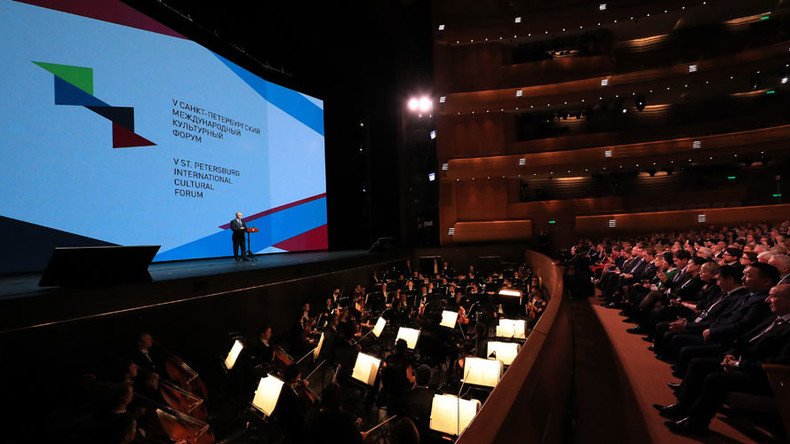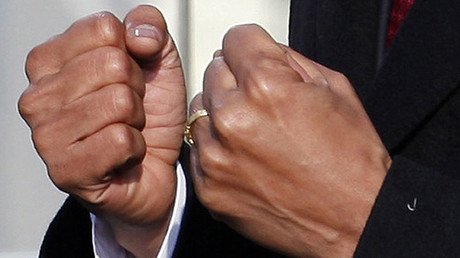Russia's artistic revival showcased at 5th St. Petersburg International Cultural Forum

How to protect and promote national culture in the era of turbo-globalization? How to fight back against the ‘dumbing down’ of education and public life? What is the role of the national education model in a crisis of culture and social values?
These were just three of the important topics up for discussion at this week’s Fifth St. Petersburg International Cultural Forum. The Forum constituted 275 separate events across 92 venues in Russia’s magnificent Northern capital (its beauty enhanced by seasonal snow and ice) and involved cultural activists and participants from all over the world.
On Friday night, at the new Mariinsky Theater, which opened in 2013, a special gala looked back at the Year of Cinema in Russia, and told the story of the renaissance of the Russian film industry.
The event began with a welcoming address by President Vladimir Putin and also included celebrated British actor Ralph Fiennes, who, speaking in Russian, told how since childhood he had been inspired by Russian culture.
‘Whatever happens in politics, we have deep connection in culture' - actor Ralph Fiennes to RThttps://t.co/ouJCANCJ3X
— RT (@RT_com) 3 декабря 2016 г.
The 125th anniversary of the birth of composer Sergey Prokofiev was commemorated with extracts from Sergey Eisenstein’s 1944 epic movie Ivan the Terrible, for which Prokofiev wrote the score. The fiftieth anniversary of the classic seven-hour long, Oscar-winning Soviet production of War and Peace, for many judges the best film version of Tolstoy’s work, was also marked with a dance and video display. The message from this and other events was evident. Russia remains open to outside influence and is promoting its own culture with a renewed sense of pride and enthusiasm, something that was totally lacking in the morale-sapping years of Boris Yeltsin. Then the film industry and arts were left to sink or swim as the government, and corrupt Western-backed oligarchs plundered the public purse. For instance, the LenFilm studio, which produced so many classics in the Soviet era, is once again thriving, after being near to closure. Under a government program, thousands of small picture houses in towns and villages, originally built by the Communists, have been modernized with the latest cinema technology.
However, even though state support for Russian films has increased – it must be said, it’s still way below the level of subsidy the industry received in Soviet times. And there remains the all-important question, what sort of films should Russia be making? There were calls for the government to fund productions more in tune with Russian ’philosophy’ and not just ’Americanized’ blockbusters.
The topic of cultural renewal was also covered during a one-day discussion panel held at the 18th century Herzen State Pedagogical University, entitled: ‘National and global culture and education development patterns in the framework of state sovereignty.' The issue of ’language imperialism’ - and attempts to impose a cross-borders cultural hegemony by a few Anglo-Saxon countries was raised by some the distinguished speakers. There was also criticism of the ‘Bologna Process’ which had been designed to try and achieve comparability of academic standards across Europe. Professor Kira V. Preobrazhenskaya complained that for Russian scholars to publish internationally in English-language journals, they have to criticize Russian culture. Vardan E. Bagdasaryan, Chair of History, Political Sciences and Law at Moscow State Regional University, said education and culture were, unfortunately, part of a new ‘war,' and that Anglo-Saxon journals which purport to be ’objective’ are very often biased, promoting a Western-centric view of history and also Russophobia.
Dimitri de Kochko, of the Union of Russophones of France, called for Russia to follow the example of Hollywood and the Disney Corporation and do all it could to build Russophone networks as a counter to the prevailing Western Russophobia. He noted that in the current climate in France and elsewhere in the West one can get away with saying racist things about Russians that would get the speaker into serious trouble if said about other ethnicities. Even great Russian writers like Fyodor Dostoyevsky were coming under attack for geopolitical reasons.
In my speech, I discussed cultural ‘dumbing down’ in the age of neo-liberalism and argued that this process was no accident but a deliberate policy of the West’s ruling elite, who, while keeping the best arts for themselves, wanted to create a population of docile, materialistic consumers. Aldous Huxley had meant Brave New World to be a warning; the powers-that-be seem to be using it as a blueprint.
I also contrasted the more balanced cross-border cultural exchanges which took place in the more egalitarian pre-neoliberal era, with today, when Hollywood and other organs of Western ‘soft power’ have become far too dominant.
To illustrate the point, I read from the BBC television listings from Christmas 1978, which included films and programs from the Soviet Union and other Eastern European countries. Contrast that real internationalism and open-mindedness to today, when rabidly anti-Russian neocons in the West are doing all they can to try and get RT taken off the air, and the programs we see about Russia, outside of RT, are almost always negative.
Professor Lubov M. Mosolova, a Doctor of Culturology at Herzen University, warned against having a too narrow view of ‘culture,' saying it includes far more than the arts. We can speak of an engineering culture, an Army culture and the culture of the workplace. The word ‘artists’ needs to be broadened too, as many workers and not just actors, painters, film/theater directors and dancers, are artists.
At the end of the day’s proceedings, a resolution was adopted. It noted that globalization entails not only the interpenetration of national cultures but often jeopardized the cultural identity of countries and peoples. The panel put forward some recommendations, which included Russia’s Ministry of Education and Science forming a public-professional expert group on the analysis of the current educational situation and an international youth cultural and education camp being held in St. Petersburg in the summer of 2017.
To protect and preserve national heritage and sovereign education systems in the era of globalization certainly presents many challenges but genuine humanitarians, who oppose the elites of a few countries trying to impose a dumbed-down cultural hegemony on others, will have been encouraged by what they saw and heard in St. Petersburg last week. The inspiring and life-enhancing city of Dostoyevsky, Rimsky-Korsakov, and Shostakovich, as well as of many others, in both the narrower and broader sense referred to by Lubov Mosolova, shows us the way to go. And not for the first time.
The statements, views and opinions expressed in this column are solely those of the author and do not necessarily represent those of RT.














